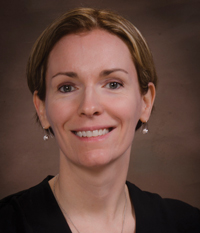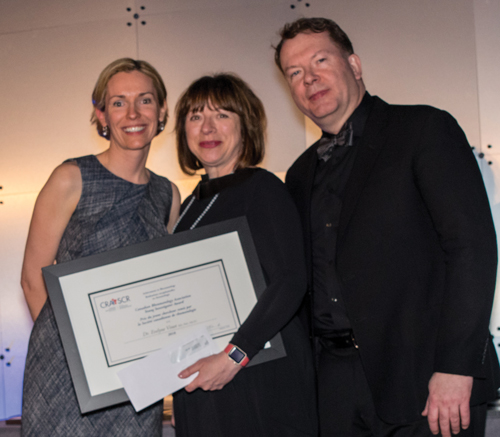Summer 2018 (Volume 28, Number 2)
Young Investigator:
Dr. Évelyne Vinet
Download PDF

What compelled/inspired you to become a rheumatologist and a medical-scientist?
My interest and fascination for lupus and other connective tissue diseases go back to how I came in contact, for the first time, with these conditions. As a medical student, the first patient I ever took care of suffered from systemic lupus erythematosus (SLE). And here, the word “suffered” has all its meaning. She was a 50-year-old woman who had developed SLE during her childbearing years. As most of her disease complications had already manifested when she was a young adult and had considerably impaired her life, she never married and never had children.
While I was rounding on her one day, her condition deteriorated quickly, and she kept telling me not to let her die, while I called the code team. I tried to resuscitate her, but she passed away. This woman and her condition made a big impression on me. Since then, I find nothing more gratifying than trying to better understand these conditions. And by attempting to do so, I think that, in a way, I’m not letting her down.
What would your advice be to a student considering the possibility of pursuing research into rheumatic diseases?
The same advice that Dr Henri Ménard once gave me: “Think outside the box”. At first, I have to admit that what he said puzzled me, but eventually I realized what he meant: to make really novel discoveries, you need to think differently and find innovative approaches to problems. Not that easy though!
What are some of the highlights and challenges you have experienced thus far in your career? How have you overcome these challenges?
One of the highlights in my career is the extraordinary mentorship that I have received. I have been extremely privileged to have as mentors, two incredible women who are accomplished researchers, Drs. Sasha Bernatsky and Ann Clarke. I am particularly grateful to Sasha, who has always been there for me. There is no doubt that without her generous support and endless patience I would not have had the same success. Her commitment to help me succeed in my career has provided me with the best mentorship that I could have wished for. Sometimes, I tease her by saying that she is my Jedi master, showing me the way of The Force, keeping me away from the Dark side, like Yoda, but with better looks! I will always be in debt to her.
I remember a particular challenge, which came very early on, even before I started my career. When I was a resident, I was told that research would not be for me as I was a woman who wanted to have children. Fortunately, I persisted, and I was lucky enough to find two mentors who I could emulate. Both Ann and Sasha have shown me that it was possible to have a successful research career, while being a mother. They both have been extremely supportive when I had my two daughters.
In fact, my daughters Capucine and Eloïse are the highlights of my life. They know nothing about a Canadian Institutes of Health Research (CIHR) grant and they couldn't care less, but they have been my inspiration and my comfort at difficult times, helping me to put everything into perspective, particularly after negative reviews and grant rejections.
Being so vital for me, my daughters made me realize how important it is to help our patients with rheumatic diseases be able to have the family they want. This has been the focus of my work over the past few years. And being a woman who wanted to have children made me pursue that goal. It did not limit my research opportunities; it helped me find my niche.

Dr. Évelyne Vinet receiving her award from Dr. Joanne Homik and Dr. Christian Pineau.
Évelyne Vinet, MD, PhD, FRCPC
Assistant Professor,
Divisions of Rheumatology and
Clinical Epidemiology
McGill University Health Centre
Montreal, Quebec
|
